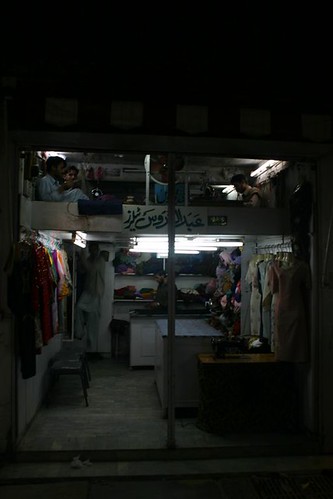Pakistan Diaries: Peshawar
Having seen four of the major cities in Pakistan, I think Peshawar is my favorite, both because of the history of the city itself, as well as the attractions around it.
Peshawar has been the cross roads of Asia for all recorded history. Founded 2,000 years ago by the kings of the ancient Gandharan civilization, Peshawar has been visited by Marco Polo, Alexander the Great, Moghul emperors, and Queen Elizabeth. When the Soviets invaded Afghanistan, the mujhadeen gathered and trained in Peshawar on their way to Afghanistan via the Khyber Pass. The money, training, and weapons that the US gave Osama bin Laden to fight the Soviets entered Afghanistan via Peshawar and the Pass.
A quick reading of the guide book suggested Peshawar is still a bit of a frontier town. There is no doubt as I step out of my taxi at my hotel. A "No assault rifles allowed on bus" sticker greets me as a bus pulls up next to me. I then pass through the first metal detector I’ve seen outside of an airport in Pakistan. Guards carefully search my luggage looking for weapons as I enter the hotel.
 The next day we hit the bazaar, seeing cramped tailors shops where the measurements are taken on the first floor, and the clothes are made in a crawlspace on the second. Shopping areas in Karachi and Lahore look a lot like shopping areas in the states. Shopping in Peshawar has some stores, but lots more open air markets where nothing is priced and haggling is expected. A good rule of thumb is to start at 20-30% of what the seller tells you the price is, and settle as high as 50% only if you really want the item, otherwise hold out for nothing more than 40%.
The next day we hit the bazaar, seeing cramped tailors shops where the measurements are taken on the first floor, and the clothes are made in a crawlspace on the second. Shopping areas in Karachi and Lahore look a lot like shopping areas in the states. Shopping in Peshawar has some stores, but lots more open air markets where nothing is priced and haggling is expected. A good rule of thumb is to start at 20-30% of what the seller tells you the price is, and settle as high as 50% only if you really want the item, otherwise hold out for nothing more than 40%.
You don’t pass for a local once you open your mouth, so you assume that you’re getting a tourist price, the main goal is to minimize the damage so you don’t just throw your money away.
Arif, a friend of my father’s, shows me how it’s done. When negotiating to buy a dagger, he and the shopkeeper are still 100-150 rupees apart. The difference is only $2.50, but the point of haggling is the principle, not because you need the money.
Arif and the shopkeeper are at an impasse. Finally, Arif takes the money out, shoves it in the shopkeeper’s hand, and tells him, "Go bag it up". The shopkeeper does so obediently. I try the trick later with some mixed success.
Also in Peshawar is the very best lamb tikka (lamb kabobs) I’ve ever had. Down in the old salt market has sprouted up a collection of restaurants, including Chirsi Tikka, named for the brothers that own the place. We tell our driver that I’m hungry for dinner and that I like lamb tikka and he brings us to this place. We are quickly ushered up into a private room and proceed to eat fabulously.
Dinner is lamb, cooked on the bone with a mixture of oils and spices in a big cast iron wok pan. Accompanying it is yogurt and vegetables (don’t eat this unless you’ve prepared it yourself, or you’re taking cipro), and the inevitable naan bread.
After a long discussion with the owner and the manager it is concluded that you couldn’t open a Chirsi place in America, since getting really, really fresh lamb (killed that afternoon) might be difficult.
This is a fact of life in Peshawar that isn’t appreciated until we start to eat. Livestock is sold on almost every street. This means that whatever you’re eating for dinner is probably extremely fresh, possibly even killed and cleaned a few hours before being served to you. This is even true for sugar as well. Sugar cane is grown outside Peshawar and brought to the mills nearby.
Continue reading Pakistan Diaries: Darra bazaar